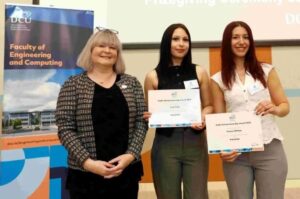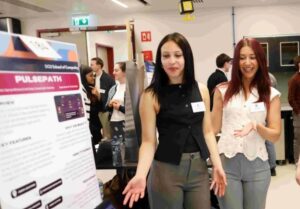 DCU’s four-year Computing for Business degree combines computing and technology with key entrepreneurial and project management skills. In their final year, students apply what they’ve learned in a major project and develop market-ready products, complete with business plans, which are showcased to industry professionals at an end-of-year expo.
DCU’s four-year Computing for Business degree combines computing and technology with key entrepreneurial and project management skills. In their final year, students apply what they’ve learned in a major project and develop market-ready products, complete with business plans, which are showcased to industry professionals at an end-of-year expo.
For their final year project, Zeynep Altintas and Lizel Sulaj first considered creating a health app, but their supervisor suggested they think again. “It might have been a good idea, but it wasn’t something we were that passionate about,” Lizel explains, “so we got to thinking about actual problems that we face.” As music fans and regular festival attendees, the all-too-familiar issue of toilet queues came to mind. “We go to festivals all the time, and if we were to know what toilets were less busy, we could spend our time watching the artists perform, instead of wasting 40 minutes in toilet queues,” she adds.
“That’s how that the idea for our product came about, from wanting to see how many people are in a certain place at a certain time.”
Having come up with the concept for what would become PulsePath, Lizel and Zeynep started researching the crowd control market and potential competitors. “There’s nothing that’s hardware-free for festivals or outdoor events,” Lizel explains, “and that’s when we realised that we had somewhat of a unique idea.”
PulsePath is a web application designed to enhance crowd safety and resource management at medium- to large-scale open-air festivals. The platform provides real-time crowd density insights, enabling organisers to monitor congestion, improve response times, and allocate staff and amenities more efficiently. As Zeynep explains, she and Lizel created PulsePath from the ground up.
“We were able to create the product, work on the business analysis and the coding side and everything else that goes into it.”
While it started from a desire to enhance attendee experience at festivals, they soon realised a broader and more profitable route for PulsePath was with the festival organisers. “The analytics we can gather through counting people and seeing how the crowd evolves throughout the festival day is valuable data for the organisers,” Lizel says. “It will help them make decisions on future events in terms of placement, security, and staff allocation.”
The response from their lecturer and classmates was resoundingly positive, which led the pair to think their idea had real business potential. “During our first semester of final year, we had an entrepreneurship module and were able to refine our idea as part of that class,” Zeynep explains. “Our lecturer was really interested in the idea and connected us with someone we could get primary research from.” They carried out some research in an Irish whiskey distillery, where their findings validated their initial ideas.
Encouraged by the feedback, the pair decided to put their project forward for the Mallin Entrepreneurship Award, which offers seed funding and mentorship. Their belief in PulsePath proved to be justified. “When we got the email saying that we’d won I couldn’t believe it,” Lizel laughs.
They also came in the top 10 of the Enterprise Ireland Student Entrepreneur Awards. As Zeynep notes, the judges were particularly impressed that the duo had built PulsePath themselves. “That was a real pat on the back,” she says.

There is huge scope for PulsePath across multiple scenarios, from marathons to parades and other events. The pair are currently looking into a feasibility fund with their supervisor and will hopefully progress to a commercialisation fund. “That would be the dream,” Lizel says, “to get that commercialisation fund and start developing the product.”
Along with significant seed funding, winning the Mallin Entrepreneurship Award has given them an invaluable chance to meet other entrepreneurs and experts who can offer advice and support. “It’s a great opportunity,” Zeynep says. “We’re talking to people who are passionate about our idea and are saying, ‘I want to work with you on this and get it further along’.”
“The seed funding is great, but you can’t really do much without guidance and we’re getting a lot of that. We’ve been given an office in the Polaris building too, which is crazy!”
“The guidance is the biggest thing, I think” Lizel adds. “It’s a great way to have a first venture into the entrepreneurship world, and we’re very thankful.”